Our life is influenced in a large measure by commercial advertising. Such publicity is undertaken only in the interest of the advertisers and not of the consumers. For example, the public has been made to believe that white bread is better than brown. Then, flour has been bolted more and more thoroughly and thus deprived of its most useful components. Such treatment permits its preservation for longer periods and facilitates the making of bread. The millers and the bakers earn more money. The consumers eat an inferior product, believing it to be a superior one. And in the countries where bread is the principal food, the population degenerates. Enormous amounts of money are spent for publicity. As a result, large quantities of alimentary and pharmaceutical products, at the least useless, and often harmful, have become a necessity for civilized men. In this manner the greediness of individuals, sufficiently shrewd to create a popular demand for the goods that they have for sale, plays a leading part in the modern world.[1]
These problems of modern civilization were addressed during the Medieval era, under religious sanction, and under organization sanction via the Guilds, and yet our era is regarded as “progressive” and full of unlimited possibilities and that of the past as superstition-ridden and ignorant.
Man is for Carrel first a spiritual being, who has entered a degenerative state through artificial behavior patterns induced by industrialization.
The definition of good and evil is based both on reason and on the immemorial experience of humanity. It is related to basic necessities of individual and social life. However, it is somewhat arbitrary. But at each epoch and in each country it should be very clearly defined and identical for all classes of individuals. The good is equivalent to justice, charity, beauty. The evil, to selfishness, meanness, ugliness. In modern civilization, the theoretical rules of conduct are based upon the remains of Christian morals. No one obeys them. Modern man has rejected all discipline of his appetites. However, biological and industrial morals have no practical value, because they are artificial and take into consideration only one aspect of the human being. They ignore some of our most essential activities. They do not give to man an armor strong enough to protect him against his own inherent vices.
In order to keep his mental and organic balance, man must impose upon himself an inner rule. The state can thrust legality upon people by force. But not morality. Everyone should realize the necessity of selecting the right and avoiding the wrong, of submitting himself to such necessity by an effort of his own will. The Roman Catholic Church, in its deep understanding of human psychology, has given to moral activities a far higher place than to intellectual ones. The men, honored by her above all others, are neither the leaders of nations, the men of science, nor the philosophers. They are the saints–that is, those who are virtuous in a heroic manner. When we watch the inhabitants of the new city, we fully understand the practical necessity of moral sense. Intelligence, will power, and morality are very closely related. But moral sense is more important than intelligence. When it disappears from a nation the whole social structure slowly commences to crumble away. In biological research, we have not given so far to moral activities the importance that they deserve. Moral sense must be studied in as positive a manner as intelligence. Such a study is certainly difficult. But the many aspects of this sense in individuals and groups of individuals can easily be discerned. It is also possible to analyze the physiological, psychological, and social effects of morals. Of course, such researches cannot be undertaken in a laboratory. Field work is indispensable. There are still today many human communities which show the various characteristics of moral sense, and the results of its absence or of its presence in different degrees. Without any doubt, moral activities are located within the domain of scientific observation.[2]
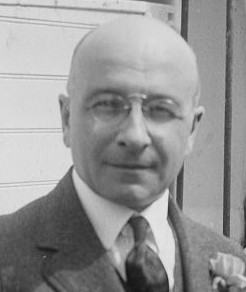 While Carrel has been deemed since 1944 to be a “fascist,” a “collaborator,” and a “Nazi,” his championing of the individual rather than the mass does not sit well with stereotypical images. Like others skeptical of democracy and equality, he opposed the leveling tendencies of the modern era, be they in the form of capitalism or Marxism, both of which had accepted the same formulation of man and society, Carrel in Reflections on Life calling the Liberal bourgeois the elder brother of the Bolshevist.
While Carrel has been deemed since 1944 to be a “fascist,” a “collaborator,” and a “Nazi,” his championing of the individual rather than the mass does not sit well with stereotypical images. Like others skeptical of democracy and equality, he opposed the leveling tendencies of the modern era, be they in the form of capitalism or Marxism, both of which had accepted the same formulation of man and society, Carrel in Reflections on Life calling the Liberal bourgeois the elder brother of the Bolshevist.
Modern society ignores the individual. It only takes account of human beings. It believes in the reality of the Universals and treats men as abstractions. The confusion of the concepts of individual and of human being has led industrial civilization to a fundamental error, the standardization of men. If we were all identical, we could be reared and made to live and work in great herds, like cattle. But each one has his own personality. He cannot be treated like a symbol.[3]
One symptom of mass society is that of mass education, and Carrel here focuses on the role of the family and especially the mother as the prime educator of the child before any institution. This championing of the family rather than the State is contrary to all collectivist schemes, which seek to eliminate the family as an obstacle to State totality.
Children should not be placed, at a very early age, in schools where they are educated wholesale. As is well known, most great men have been brought up in comparative solitude, or have refused to enter the mold of the school. Of course, schools are indispensable for technical studies. They also fill, in a certain measure, the child’s need of contact with other children. But education should be the object of unfailing guidance. Such guidance belongs to the parents. They alone, and more especially the mother, have observed, since their origin, the physiological and mental peculiarities whose orientation is the aim of education. Modern society has committed a serious mistake by entirely substituting the school for the familial training. The mothers abandon their children to the kindergarten in order to attend to their careers, their social ambitions, their sexual pleasures, their literary or artistic fancies, or simply to play bridge, go to the cinema, and waste their time in busy idleness. They are, thus, responsible for the disappearance of the familial group where the child was kept in contact with adults and learned a great deal from them.[4]
It is relevant to note here that the family was indeed the basis of the Vichy regime that sought a “National Revolution” based on the dictum “Work, Family, Homeland.” Among the family-orientated measures of the Vichy regime was the “Mother-at-home” allowance,[5] the type of legislation that is still being sought in the Western democracies. The “family allowance” increased with the birth of each child.[6] Maternity welfare provided for women to be taken by a hospital one month before and one month after the birth of a child,[7] a measure that would today in our liberal “welfare states” now seem utopian.
Likewise, Carrel lamented the phenomena of mass production and man as factory fodder, where there was once craft centered on a religious ethos rather than a strictly economic one.
The neglect of individuality by our social institutions is, likewise, responsible for the atrophy of the adults. Man does not stand, without damage, the mode of existence, and the uniform and stupid work imposed on factory and office workers, on all those who take part in mass production. In the immensity of modern cities he is isolated and as if lost. He is an economic abstraction, a unit of the herd. He gives up his individuality. He has neither responsibility nor dignity. Above the multitude stand out the rich men, the powerful politicians, the bandits. The others are only nameless grains of dust. On the contrary, the individual remains a man when he belongs to a small group, when he inhabits a village or a small town where his relative importance is greater, when he can hope to become, in his turn, an influential citizen. The contempt for individuality has brought about its factual disappearance.[8]
Again, Carrel seems to be alluding in his ideal for a return to the medieval ethos. And again, one finds here also that Carrel’s social critique is far from misanthropic, as has been more recently claimed by his post-mortem “anti-fascist” avengers. He is a physician trying to diagnose and treat the cancerous growth of the mass tyranny of the modern era.
Carrel’s conclusion is that man, who has transformed the material world through science, is also capable of transforming himself. But he will not transform himself without necessity, because he has become complacent amidst the artificial lifestyle of industrial civilization.
While surrounded by the comfort, the beauty, and the mechanical marvels engendered by technology, he does not understand how urgent is this operation. He fails to realize that he is degenerating. Why should he strive to modify his ways of being, living, and thinking?[9]
Carrel regarded the Great Depression as a fortuitous opportunity, because of the undermining of public confidence in the economic system, which might impel people to seek a redirection.
Has not modern life decreased the intelligence and the morality of the whole nation? Why must we pay several billions of dollars each year to fight criminals? Why do the gangsters continue victoriously to attack banks, kill policemen, kidnap, ransom, or assassinate children, in spite of the immense amount of money spent in opposing them? Why are there so many feeble-minded and insane among civilized people? Does not the world crisis depend on individual and social factors that are more important than the economic ones? It is to be hoped that the spectacle of civilization at this beginning of its decline will compel us to ascertain whether the causes of the catastrophe do not lie within ourselves, as well as in our institutions. And that we will fully realize the imperativeness of our renovation.
…The spontaneous crash of technological civilization may help to release the impulses required for the destruction of our present habits and the creation of new modes of life.[10]
What Carrel called for was the creation of a new ruling state of renaissance men who would be educated in all the arts and sciences, having renounced ordinary life to form a ruling class better capable of creating a new civilization in keeping with man’s true nature, than can politicians and plutocrats.
Indeed, the few gifted individuals who dedicate themselves to this work will have to renounce the common modes of existence. They will not be able to play golf and bridge, to go to cinemas, to listen to radios, to make speeches at banquets, to serve on committees, to attend meetings of scientific societies, political conventions, and academies, or to cross the ocean and take part in international congresses. They must live like the monks of the great contemplative orders, and not like university professors, and still less like business men. In the course of the history of all great nations, many have sacrificed themselves for the salvation of the community. Sacrifice seems to be a necessary condition of progress.[11]
Eugenics was also a significant aspect of Carrel’s beliefs, and the matter for which he is most smeared, although eugenic ideas among physiologists at that time were the norm, and what Carrel advocated was on par with the sterilization measures already undertaken by many states of the USA,[12] and was at that time even advocated by socialists, as was particularly the case in Sweden. Hence, Carrel stated:
Eugenics may exercise a great influence upon the destiny of the civilized races. Of course, the reproduction of human beings cannot be regulated as in animals. The propagation of the insane and the feeble-minded, nevertheless, must be prevented. A medical examination should perhaps be imposed on people about to marry, as for admission into the army or the navy, or for employees in hotels, hospitals, and department stores. However, the security given by medical examination is not at all positive. The contradictory statements made by experts before the courts of justice demonstrate that these examinations often lack any value. It seems that eugenics, to be useful, should be voluntary. By an appropriate education, each one could be made to realize what wretchedness is in store for those who marry into families contaminated by syphilis, cancer, tuberculosis, insanity, or feeble-mindedness. Such families should be considered by young people at least as undesirable as those which are poor. In truth, they are more dangerous than gangsters and murderers. No criminal causes so much misery in a human group as the tendency to insanity. Voluntary eugenics is not impossible. […]None should marry a human being suffering from hidden hereditary defects. Most of man’s misfortunes are due to his organic and mental constitution and, in a large measure, to his heredity. Obviously, those who are afflicted with a heavy ancestral burden of insanity, feeblemindedness, or cancer should not marry. No human being has the right to bring misery to another human being. Still less, that of procreating children destined to misery.[13]
It is clear that for all the slander against Carrel as a eugenicist, his position on the matter was moderate for the time, and was to be voluntary, based on a combination of education and financial rewards. However, also of great importance in Carrel’s system was education and culture.
Children must be reared in contact with things which are the expression of the mind of their parents. It is imperative to stop the transformation of the farmer, the artisan, the artist, the professor, and the man of science into manual or intellectual proletarians, possessing nothing but their hands or their brains. The development of this proletariat will be the everlasting shame of industrial civilization. It has contributed to the disappearance of the family as a social unit, and to the weakening of intelligence and moral sense. It is destroying the remains of culture. All forms of the proletariat must be suppressed. Each individual should have the security and the stability required for the foundation of a family.[14]
Elsewhere Carrel writes again of the undesirability of mass proletarianization and the need for a new economic system:
The artisan, on the contrary, has the legitimate hope that some day he may become the head of his shop. Likewise, the peasant owning his land, the fisherman owning his boat, although obliged to work hard, are, nevertheless, masters of themselves and of their time. Most industrial workers could enjoy similar independence and dignity. The white-collar people lose their personality just as factory hands do. In fact, they become proletarians. It seems that modern business organization and mass production are incompatible with the full development of the human self. If such is the case, then industrial civilization, and not civilized man, must go.[15]
In the same paragraph Carrel emphasis the basic social unit as being the family, predicated on sound and lasting marriage for the raising of healthy children, and the education of women geared to raising children.
Marriage must cease being only a temporary union. The union of man and woman, like that of the higher anthropoids, ought to last at least until the young have no further need of protection. The laws relating to education, and especially to that of girls, to marriage, and divorce should, above all, take into account the interest of children. Women should receive a higher education, not in order to become doctors, lawyers, or professors, but to rear their offspring to be valuable human beings.[16]
Feminism has resulted in what we might call the proletarianization of women, whether in menial or intellectual arenas, as increasing numbers especially over the past several decades have opted for jobs rather than children, even for the sake of their social life, or have been leaving child bearing to increasingly later ages until procreation becomes a problem. If Carrel were alive today, he would undoubtedly have much to say about the decline fertility rates among males also, perhaps looking at environmental and nutritional factors for explanations. At any rate the question of food quality is broached by Carrel several times in Man the Unknown, for example:
We now have to reestablish, in the fullness of his personality, the human being weakened and standardized by modem life. Sexes have again to be clearly defined. Each individual should be either male or female, and never manifest the sexual tendencies, mental characteristics, and ambitions of the opposite sex. Instead of resembling a machine produced in series, man should, on the contrary, emphasize his uniqueness. In order to reconstruct personality, we must break the frame of the school, factory, and office, and reject the very principles of technological civilization.
The effect of the chemical compounds contained in food upon physiological and mental activities is far from being thoroughly known. Medical opinion on this point is of little value, for no experiments of sufficient duration have been made upon human beings to ascertain the influence of a given diet. There is no doubt that consciousness is affected by the quantity and the quality of the food.[17]
Carrel, as a social-physician in the closing paragraphs of his seminal work again shows that what he was advocating was of a humane character; that he was not a social-Darwinist with a disregard for the weaker elements of society:
The brutal materialism of our civilization not only opposes the soaring of intelligence, but also crushes the affective, the gentle, the weak, the lonely, those who love beauty, who look for other things than money, whose sensibility does not stand the struggle of modern life. In past centuries, the many who were too refined, or too incomplete, to fight with the rest were allowed the free development of their personality. Some lived within themselves. Others took refuge in monasteries, in charitable or contemplative orders, where they found poverty and hard work, but also dignity, beauty, and peace. Individuals of this type should be given, instead of the inimical conditions of modern society, an environment more appropriate to the growth and utilization of their specific qualities.[18]
Notes
1. Man the Unknown.
2. Man the Unknown, ch. 4: 3.
3. Man the Unknown, ch. 7: 10.
4. Man the Unknown, ch. 7: 10.
5. Decree of October 11, 1940.
6. Laws of November 18, 1940; February 15, 1941.
7. Law no. 3763, September 2, 1941.
8. Alexis Carrel, Man the Unknown, ch. 7: 10.
9. Man the Unknown, ch. 7: 10., ch. 8: 1.
10. Man the Unknown, ch. 7: 10.
11. Man the Unknown, ch. 8:3.
12. Indiana became the first US state to enact a sterilization law in 1907, directed towards the “feebleminded.” In 1927 the US Supreme Court ruled 8 to that sterilization laws for the mentally handicapped were not unconstitutional, Justice Holmes writing of the decision: “It is better for all the world, if instead of waiting to execute degenerate offspring for crime, or to let them starve for their imbecility, society can prevent those who are manifestly unfit from continuing their kind.” As late as 1970 the Nixon Administration increased Medicaid funding for the voluntary sterilization of low-income Americans. The last forcible sterilization occurred in the USA in 1981, in Oregon, under the direction of the Oregon Board of Eugenics. Social democratic Sweden was particularly active with a eugenic sterilization program from 1934, the laws not being repealed until 1976. Around 31,000 had been sterilized, by far the majority forcibly.
13. Man the Unknown, ch. 8:7.
14. Man the Unknown, ch. 8:7.
15. Man the Unknown, ch. 8:12.
16. Reflections on Life, ch. 8: 12.
17. Reflections on Life, ch. 8: 12.
18. Reflections on Life, ch. 8: 12.
Alexis Carrel:
A Commemoration, Part 3
Reflections on Life
Three of Carrel’s books were published posthumously, Reflections on Life[1] being particularly instructive in further explicating Carrel’s views on civilization. Here Carrel states that the great problem of the day is for man to increase not only his intelligence, but also a robustness of character and morality, and to maintain a spiritual outlook, these qualities having atrophied and failed to keep pace with technical evolution.[2] Based on his experiments and observations Carrel states that the organism is greatly malleable and changed by circumstances of environment. This two-way interaction between environment and genes seems often to be overlooked in a dichotomy existing between genetic determinists and environmental determinists. Therefore, what Carrel presents is a synthesis, writing:
The formation of body and mind depends on the chemical, physical and psychological conditions of the environment and on physiological habits. The effects of these conditions and these habits on the whole make-up of the individual ought to be exactly studied with reference to all activities of body and mind.[3]
Throughout his life he also emphasized the importance of the spiritual and the religious, and he remained a Christian.
 Carrel proceeds with the first chapter to trace the dissolution of traditional communal bonds with the ancestral traditions being undermined from the time of the Renaissance, through to the Reformation, and the revolutions of France and America, enthroning of rationalism and heralding the rise of liberalism and Marxism:
Carrel proceeds with the first chapter to trace the dissolution of traditional communal bonds with the ancestral traditions being undermined from the time of the Renaissance, through to the Reformation, and the revolutions of France and America, enthroning of rationalism and heralding the rise of liberalism and Marxism:
The democratic nations fail to recognize the value of scientific concepts in the organization of communal life. They put their trust in ideologies, those twin daughters of the rationalism of the Age of Enlightenment. Yet neither Liberalism nor Marxism bases itself on an exhaustive observation of reality. The fathers of Liberalism, Voltaire and Adam Smith, had just as arbitrary and incomplete a view of the human world as Ptolemy had of the stellar system. The same applies to those who signed the Declaration of Independence, to the authors of the Declaration of the Rights of Man and of the Citizen as also to Karl Marx and Engels.[4]
At the root of these ideologies of capitalism and socialism alike is economic reductionism, which has given rise to the artificiality of a civilization that Carrel condemned for fostering a weakened state of humanity, physiologically, morally, spiritually, and mentally:
The principles of the Communist Manifesto are, in fact, like those of the French Revolution, philosophical views and not scientific concepts. The Liberal bourgeois and the Communist worker share the same belief in the primacy of economics. This belief is inherited from the philosophers of the eighteenth century. It takes no account of the scientific knowledge of the mental and physiological activities of man we possess today nor of the environment which these activities need for their ideal development. Such knowledge shows that primacy belongs not to economics, but to man’s own humanity. Instead of trying to find how to organize the State as a function of the human, we are content to declaim the principles of the Declaration of Independence and of the French Revolution. According to these principles, the State is, above all, the guardian of property; the head servant of banking, industry and commerce.[5]
This liberty has brought nothing real to the multitude of proletarianized masses.
The liberty enjoyed by the majority of men does not belong to the economic, intellectual or moral order. The dispossessed have merely the liberty to go from one slum or one public house to another. They are free to read the lies of one paper rather than another, to listen to opposing forms of radio propaganda and, finally, to vote. Politically they are free; economically they are slaves. Democratic liberty exists only for those who possess something. It allows them to increase their wealth and to enjoy all the various goods of this world. It is only fair to admit that, thanks to it, Capitalism has achieved a vast expansion of wealth and a general improvement in health and in the material conditions of life. But it has, at the same time, created the proletariat. Thus it has deprived men of the land, encouraged their herding together in factories and appalling dwellings, endangered their physical and mental health and divided nations into mutually hostile social classes. The Encylopedists had a profound respect for the owners of property and despised the poor. The French Revolution was directed against both the aristocracy and the proletariat It was content to substitute the rat for the Hon; the bourgeois for the noble. Now Marxism aims at replacing the bourgeois by the worker. The successor of Capitalism is Bureaucracy. Like Liberalism, Marxism arbitrarily gives first place to economics. It allows a theoretical liberty only to the proletariat and suppresses all other classes. The real world is far more complex than the abstraction envisaged by Marx and Engels.[6]
Here, as in many other places of Carrel’s writing, we see this his concern is for humanity, for the poor and oppressed that have been reduced to a mass and meaningless existence in the name of “economic liberty,” and it soon becomes apparent that the Marxists and liberals who smeared Carrel as some type of fiendish Nazi doctor with a depraved outlook on humanity, are either lying or ignorant. If Carrel spoke “against” the proletariat it was in defense of the “worker” as artisan, craftsmen, tiller, and in opposition to a process that continues to deprive man of his humanity:
Human labor is not something which can be bought like any other commodity. It is an error to depersonalize the thinking and feeling being who operates the machine and to reduce him, in industrial enterprise, to mere “manpower.” Homo oeconomicus is a fantasy of our imagination and has no existence in the concrete world.[7]
Carrel’s adherence to the Christian faith as the basis of civilized values is a refreshing surprise from the usual atheism and materialism of scientific social commentators. Carrel maintains that Christianity provides the foundations for social bonds above all other beliefs, whether rationalistic or metaphysical.
In an unknown village of Palestine, on the shores of Lake Tiberias, a young carpenter announced some astonishing news to a few ignorant fishermen. We are loved by an immaterial and all-powerful Being. This Being is accessible to our prayers. We must love Him above all creatures. And we ourselves must also love one another.
A new era had begun. The only cement strong enough to bind men together had been found. Nevertheless, humanity chose to ignore the importance of this new principle in the organization of its collective life. It is far from having understood that only mutual love could save it from division, ruin and chaos. Nor has it realized that no scientific discovery was so fraught with significance as the revelation of the law of love by Jesus the Crucified. For this law is, in fact, that of the survival of human societies.[8]
It was this Christian faith that molded the heroic ethos and chivalry of the West, Christianity providing the feeling of “the beauty of charity and renunciation” above the “savage and lustful appetites.” Man, or better said the Westerner,
was drawn to the heroism which, in the hell of modern warfare, consists in giving one’s life for one’s friends; and in having pity on the vanquished, the sick, the weak and the abandoned. This need for sacrifice and brotherhood became more defined in the course of centuries. Then appeared St. Louis of France, St. Francis of Assisi, St. Vincent de Paul and a numberless legion of apostles of charity.[9]
It is this ethos of individual sacrifice and renunciation which Carrel states has been increasingly obliterated by the ideologies of the modern era, and which is required again to overcome the problems of the present, particularly in developing a ruling caste that he wished to see emerge and live for the service of humanity.
Even in our own base and egotistical age, thousands of men and women still follow, on the battlefield, in the monastery or in that abomination of desolation the modern city, the path of heroism, abnegation and holiness.[10]
“Our civilization,” by which Carrel must mean Western Civilization, “has, in truth, forgotten that it is born of the blood of Christ; it has also forgotten God,” but there remains a basic discernment of the beauty of the Gospels and the Sermon on the Mount.[11] As a scientist Carrel sees Christian morality not as some contrivance to maintain a ruling class, but as reflecting fundamental laws of life that are in accord with nature, and in keeping with the survival imperative. On the other hand just as mistaken are those moralists who see Christianity as negating the need for humanity to act in accordance with the discoveries of nature being revealed by science. [12] Here again, Carrel is proposing a synthesis, rather than a dichotomy. Therefore the Christian commandment against killing is applicable in a broad sense, there being many ways of killing, and the destroyers or killers of humanity include,
The profiteer who sends up the price of necessities, the financier who cheats poor people of their savings, the industrialist who does not protect his workmen against poisonous substances, the woman who has an abortion and the doctor who performs it are all murderers. Murderers, too, are the makers of harmful liquor and the wine growers who conspire with politicians to increase the consumption of drink; the sellers of dangerous drugs; the man who encourages his friend to drink; the employer who forces his workers to work and live in conditions disastrous to their bodies and minds.[13]
Carrel was not preaching any doctrine of pandering to the weak, any more than a misanthropic crushing, but rather one of the strengthening of humanity by disposing of the artificiality that has become the basis of civilization, and has halted human ascent. In this respect there is a certain coincidental resemblance to the Nietzschean over-man, when not misinterpreted or misconstrued as something monstrous. Hence man must again become re-acclimatized to harsh environmental conditions, as a matter of will and self-discipline.
The rules to follow are many, but simple. They consist in leading our daily life as the structure of our body and mind demands. We must learn to endure heat, cold and fatigue; to walk, run and climb in all extremes of weather. We must also avoid as much as possible the artificial atmosphere of offices, flats and motorcars. In the choice of the quantity of food we eat we ought to follow modern principles of nutrition. We should sleep neither too much nor too little and in a quiet atmosphere. . . . We should also accomplish daily, outside of our professional work, some definite task of an intellectual, aesthetic, moral or religious nature. Those who have the courage to order their existence thus will be magnificently rewarded. . . .[14]
As in Man the Unknown, Carrel was concerned with the affects of declining birth rates, as a symptom of decline, which he states has social and economic causes and which can consequently be reversed by the State proving generously for the rearing of healthy children. Education is also required to make eugenically sound and conscious decisions when mating, an issue which is perhaps more than any others raised by Carrel,[15] anathema to liberal sensibilities.
Healthy children and family life proceeds for Carrel on the basis of a reconnection with the soil.
The family must be rooted once more in the soil. Everyone should be able to have a house, however small, and make himself a garden. Everyone who already has a farm should beautify it. He should adorn it with flowers, pave the road which leads to it, destroy the briars which choke the hedges, break up the boulders which hinder the passage of the plow, and plant trees whose branches will shade his great-grandchildren. Finally, the works of art, the old houses, the splendid buildings and cathedrals in which the soul of our forefathers expressed itself must be piously preserved. We should also set ourselves against the profanation of the rivers, the tranquil hills and the forests which were the cradle of our ancestors. But our most sacred duty is to bring about a revolution in teaching which will make the school, instead of a dreary factory for certificates and diplomas, a center of moral, intellectual, aesthetic, and religious education.[16]
The return to the soil was a major aim of the Vichy regime. Uncultivated land could be granted with the aid of state allowances, and freedom from rent for the first three years, and thereafter a rental half that of similar land in the area.[17] State subsidies of up to 50% were available for new farm buildings.[18] Farm laborers, who had been increasingly leaving the land for the cities for better pay, were encouraged to take up farming themselves. State gratuities were given to all farmers who provided rural apprenticeship training, and agricultural education was reorganized, and centers established.[19]
As one should expect for a physiologist attempting to apply his observations of the natural world to the formation of a more natural human social order, the type of society Carrel advocated was what has been called the “organic state,” where each individual is in general part of at least one social organ, from the family outward, each individual and each social organ contributing by their innate character to the well-being of the entire social organism. The organic state is thus analogous to the living human organism where, where the brain – the government – co-ordinates the individual organs for the healthy functioning of the whole organism. This is contrary to the modern era where everyone is divided in to atomized individuals, or competing classes, and a myriad of other self-serving interests, to the detriment of the whole. Carrel repudiated that notion of society being held together by a “social contract” between individuals, as per the idea that has come down to us from liberalism, as the very act of being born makes an individual an automatic part of society. The coming together for common interests into social organs is a natural process.
Every individual is a member of several organismic and organic groups. He belongs to tie family, the village, and the parish and also, perhaps, to a school, a trade union, a professional society or a sports club. Thus a relatively small number of completely developed individuals can have a great influence on many community groups.[20]
Hence, an industrial enterprise, should according to such organic laws function as a social organism rather than as a disharmonic or diseased organism of contending interests, which one might compare to a cancer-afflicted body. What Carrel alludes to in his analogy of the industrial enterprise where solidarity replaces class warfare, is that the worker of an enterprise share in the profits of that enterprise; “when he cooperates in an enterprise which belongs to him and to which he belongs.”[21]
In his concluding chapter Carrel states: “Communities and industrial enterprises should be conceived as organisms whose function is to build up centers of human brotherhood where all are equal in the sense in which the Church understands men’s equality; that is to say, in the sense that all are children of God.”[22]
The suppression of the Proletariat and the liberation of the oppressed should not come about through class warfare but through the abolition of social classes.
What is needed is to suppress the Proletariat by replacing it with industrial enterprise of an organismic character. If the community has an organismic character, it matters little whether the state or private individuals own the means of production, but individual ownership of house and land is indispensable.[23]
One can discern in this organic conception of society the influence of the social doctrine of the Church combined with the observations of the biologist. It is no wonder that Carrel agreed to work with the Vichy Government in attempting to solve social problems, as the Vichy was one of numerous regimes, often inspired by Catholic social doctrine, which attempted to implement the organic or “corporate state.”[24]
What ideology then did Carrel adhere to? Apparently, none that had been operative.
Despite the smear that Carrel was a “Nazi,” he regarded National Socialism, Marxism, and liberalism as all having failed, as had the civilizations of the Classical and Medieval eras.[25] Neither is an entire answer to be found in a religious, scientific or a political system alone. There must be a holistic approach.
The break-up of Western civilization is due to the failure of ideologies, to the insufficiency both of religion and science. If life is to triumph, we need a revolution. We must reexamine every question and make an act of faith in the power of the human spirit. Our destiny demands this great effort; we ought to devote all our time to the effort of living since this is the whole purpose of our being on earth.
All men who are determined to make a success of living in the widest sense should join together as they have done in all times. Pythagoras made the first attempt, but it is the Catholic Church which has hitherto offered the most complete of such associations. We must give up the illusion that we can live according to instinct, like the bees. True, the success of life demands, above all, an effort of intelligence and will. Since intelligence has not replaced instinct we must try to render it capable of directing life.[26]
Carrel reconciles religious faith and metaphysics with science and natural law. Hence the Christian foundations of Carrel’s organic society are reiterated. He states that the reasons the “white races” have failed despite “their Christianity” is because the Christian ethos has not been sufficiently applied in practical terms to the questions presented by science. Carrel ends optimistically however in stating that unlike prior civilizations, this Civilization has the means of diagnosing its ills and therefore has the opportunity of halting the cycle of decay.
For the first time in the history of the world, a civilization which has arrived at the verge of its decline is able to diagnose its ills. Perhaps it will be able to use this knowledge and, thanks to the marvelous forces of science, to avoid the common fate of all the great peoples of the past. We ought to launch ourselves on this new path from this very moment. . . .
Before those who perfectly perform their task as men, the road of truth lies always open. On this royal road, the poor as well as the rich, the weak as well as the strong, believer and unbeliever alike are invited to advance. If they accept this invitation, they are sure of accomplishing their destiny, of participating in the sublime work of evolution, of hastening the coming of the Kingdom of God on earth. And, over and above, they will attain all the happiness compatible with our human condition.[27]
Post-Mortem Vilification
Carrel was spared the indignities of the democratic post-war era, and although he was cleared of being a “collaborationist” his doctrine of human ascent with its intrinsic opposition to liberalism, Marxism, capitalism, and rationalism, has made him the subject of smears in more recent years. The renewed “interest” was prompted in 1997 when Front National leader Jean-Marie Le Pen suggested that Carrel was the founder of ecology, which resulted in a mean-spirited campaign to get streets named after Carrel changed.[28] In 1998 a Left-wing petition was circulated to get the name of rue Alexis-Carrel in Paris changed, with the media quipping about Carrel’s supposed advocacy of brutal “Nazi-style” eugenics measures, and his so-called “dubious role” in wartime France. Hence Ben MacIntyre, journalist, for some reason felt himself qualified to remark that Carrel’s best-seller, Man the Unknown, was “pseudo-science,” one of Carrel’s most callous recommendations apparently having been to advocate the humane execution of the criminally insane.[29]
While it is something of a cliché when writing a tribute to a perhaps long forgotten individual of seemingly prophetic vision, to state that the subject had a message more relevant now than in his own time, this surely is in a myriad of ways a claim that can legitimately be made for Alexis Carrel. The many symptoms of decay he noted in his own time, from the artificiality of industrial life to the chemical adulteration of food, the standardization of life, and the rising rates of abortion are now with Western Civilization in a phase that is acute. [30]
Notes
1. Alexis Carrel, Reflections on Life. The book in its entirety has been published online: http://chestofbooks.com/society/metaphysics/Reflections-O...
2. Reflections on Life, “Preface.”
3. Reflections on Life.
4. Reflections on Life, ch. 1.
5. Reflections on Life, ch. 1.
6. Reflections on Life, ch. 1.
7. Reflections on Life, ch. 1.
8. Reflections on Life, ch. 3:6.
9. Reflections on Life, ch. 3:6.
10. Reflections on Life, ch. 3:6.
11. Reflections on Life, ch. 3:6.
12. Reflections on Life, ch. 4:3.
13. Reflections on Life, ch. 5: 2.
14. Reflections on Life, ch. 5: 3.
15. Reflections on Life, ch. 5: 8.
16. Reflections on Life, ch. 5: 4.
17. Law of August 27, 1940.
18. Law of April 17, 1941.
19. Laws of July 8, 1941, and August 25, 1941.
20. Reflections on Life, ch. 6: 10.
21. Reflections on Life, ch. 6: 10.
22. Reflections on Life, ch. 9: 3.
23. Reflections on Life, ch. 9: 3.
24. Other corporate states directly inspired by Catholic social doctrine included Salazar’s Portugal, Franquist Spain and the Austria of Dollfuss.
25. Reflections on Life, ch. 9: 2.
26. Reflections on Life, ch. 9: 2.
27. Reflections on Life, ch. 9: 3.
28. David Zen Mairowitz, “Fascism a la Monde,” Harper’s, October 1997.
29. Ben MacIntyre, “Paris Left wants eugenics advocate taken off street,” The Times, January 6, 1998.
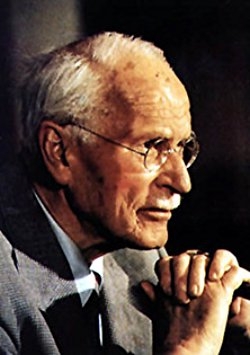 Carl Jung
Carl Jung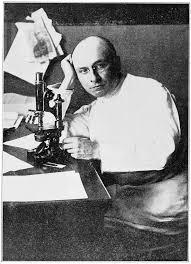 Alexis Carrel
Alexis Carrel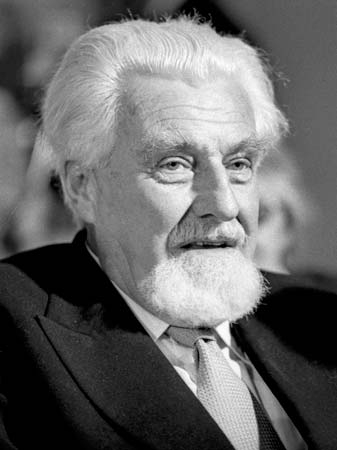 Konrad Lorenz
Konrad Lorenz




 del.icio.us
del.icio.us
 Digg
Digg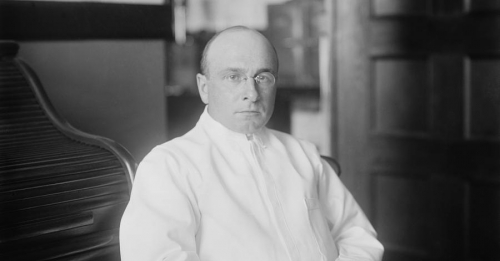
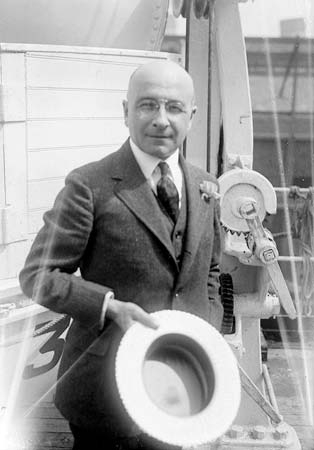
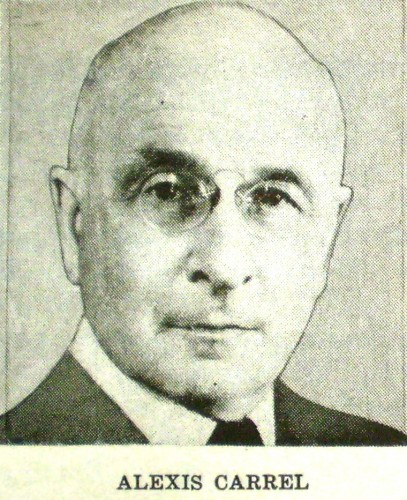
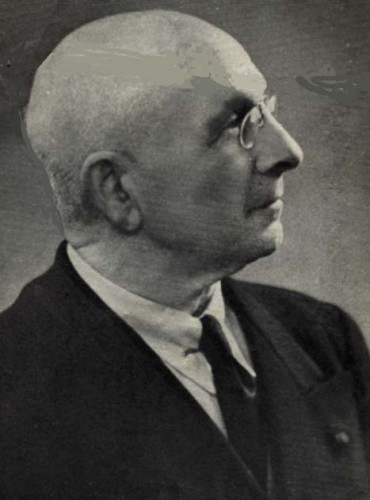 Alexis Carrel, an observer of the material universe, was one among a unique lineage of scientists who sought out solutions to what they considered were the primary problems confronting the modern world. For Carrel the material progress that was jumping by leaps and bounds from the 19th century across into his century was causing moral, physical and spiritual degeneration. While scientists, then as now overspecialized, and devoid of a broad perspective, were making new discoveries in the physical and social sciences, problems of degeneration and its ultimate consequences were not being sufficiently addressed in a holistic manner.
Alexis Carrel, an observer of the material universe, was one among a unique lineage of scientists who sought out solutions to what they considered were the primary problems confronting the modern world. For Carrel the material progress that was jumping by leaps and bounds from the 19th century across into his century was causing moral, physical and spiritual degeneration. While scientists, then as now overspecialized, and devoid of a broad perspective, were making new discoveries in the physical and social sciences, problems of degeneration and its ultimate consequences were not being sufficiently addressed in a holistic manner. While Carrel has been deemed since 1944 to be a “fascist,” a “collaborator,” and a “Nazi,” his championing of the individual rather than the mass does not sit well with stereotypical images. Like others skeptical of democracy and equality, he opposed the leveling tendencies of the modern era, be they in the form of capitalism or Marxism, both of which had accepted the same formulation of man and society, Carrel in Reflections on Life calling the Liberal bourgeois the elder brother of the Bolshevist.
While Carrel has been deemed since 1944 to be a “fascist,” a “collaborator,” and a “Nazi,” his championing of the individual rather than the mass does not sit well with stereotypical images. Like others skeptical of democracy and equality, he opposed the leveling tendencies of the modern era, be they in the form of capitalism or Marxism, both of which had accepted the same formulation of man and society, Carrel in Reflections on Life calling the Liberal bourgeois the elder brother of the Bolshevist. Carrel proceeds with the first chapter to trace the dissolution of traditional communal bonds with the ancestral traditions being undermined from the time of the Renaissance, through to the Reformation, and the revolutions of France and America, enthroning of rationalism and heralding the rise of liberalism and Marxism:
Carrel proceeds with the first chapter to trace the dissolution of traditional communal bonds with the ancestral traditions being undermined from the time of the Renaissance, through to the Reformation, and the revolutions of France and America, enthroning of rationalism and heralding the rise of liberalism and Marxism: